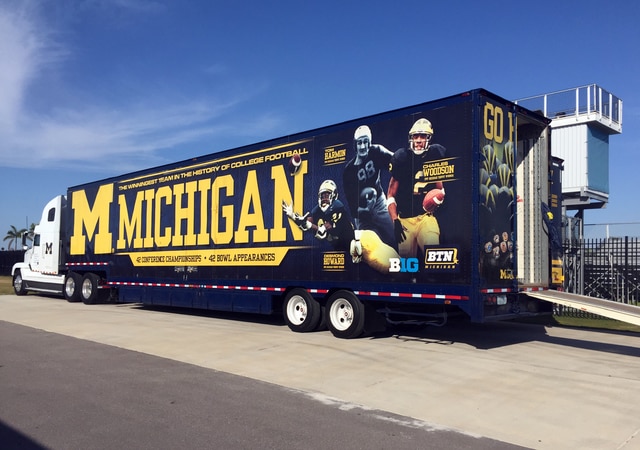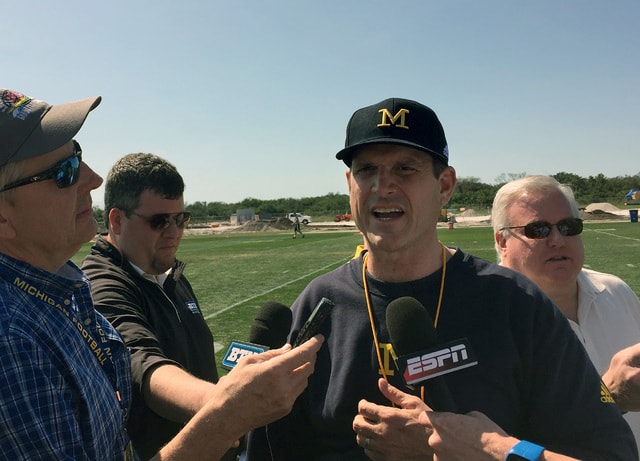

The NCAA Division I Board of Directors rescinded a proposed ban on satellite camps Thursday, rebuffing a request from powerhouse conferences in the South and clearing the way for coaches to hold clinics far from their campuses this summer.
The board’s decision came almost three weeks after the Division I Council approved a proposal prohibiting Bowl Subdivision coaches from holding or working at camps and clinics away from their schools. The camps had drawn a high profile since Jim Harbaugh and his Michigan staff held camps in the South last summer.
“Good news,” Harbaugh said in a telephone interview with The Associated Press after the decision. “It’s good for prospective student-athletes, fans, coaches and competition.”
The Southeastern Conference and Atlantic Coast Conference sponsored the proposal that created the ban, but there was an immediate outcry from coaches who contend satellite camps provide opportunities for un-recruited athletes to be noticed by high-profile coaches and possibly receive scholarships.
“While we are disappointed with the NCAA governance process result, we respect the Board of Directors’ decision and are confident SEC football programs will continue to be highly effective in their recruiting efforts,” SEC Commissioner Greg Sankey said.
The SEC had warned it would lift its ban on satellite camp participation without an NCAA-wide ban. Sankey said SEC coaches will now be allowed to participate.
“We continue to believe football recruiting is primarily an activity best focused in high schools during the established recruiting calendar, which has provided opportunities for football prospective student-athletes from all across the country to obtain broad national access and exposure but with appropriate guidance from high school coaches, teachers and advisers,” Sankey said.
The Board of Directors also directed the council to conduct a broad assessment of FBS recruiting, with initial recommendations due by Sept. 1.
“The Board of Directors is interested in a holistic review of the football recruiting environment, and camps are a piece of that puzzle,” said Board Chairman Harris Pastides, president of the University of South Carolina. “We share the council’s interest in improving the camp environment, and we support the council’s efforts to create a model that emphasizes the scholastic environment as an appropriate place for recruiting future student-athletes.”
Opponents of the camps say they are simply recruiting events held outside the recruiting calendar.
The Big Ten turned out to be the only Power Five conference in the D-I Council to oppose the ban. The Big 12 and Pac-12 joined the SEC and ACC in voting for the ban, even though a significant number of coaches within those conferences favored satellite camps. Pac-12 Commissioner Larry Scott later said the conference’s representative did not vote the league’s position in backing the ban.
Council Chairman Jim Phillips, a board member and athletic director at Northwestern, said the board’s decision will give the council an opportunity to review the recruiting environment in a more thorough way.
“It’s clear that the membership has differing views on this subject, and the council appreciates the board’s insights into this important issue,” Phillips said. “This review will provide an opportunity to identify the most effective ways prospective student-athletes can have their academic and athletic credentials evaluated by schools across the country.”
__
AP Sports Writers Larry Lage and John Zenor contributed to this report.

The boards action Thursday, April 28, 2016, comes almost three weeks after the Division I Council approved a proposal prohibiting Bowl Subdivision coaches from holding or working at camps and clinics away from their schools. (AP Photo/Ralph Russo, File)

The boards action Thursday, April 28, 2016, comes almost three weeks after the Division I Council approved a proposal prohibiting Bowl Subdivision coaches from holding or working at camps and clinics away from their schools. (AP Photo/Ralph Russo, File)

